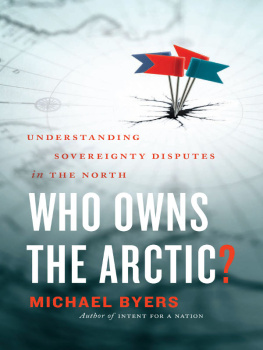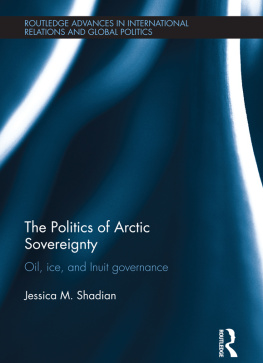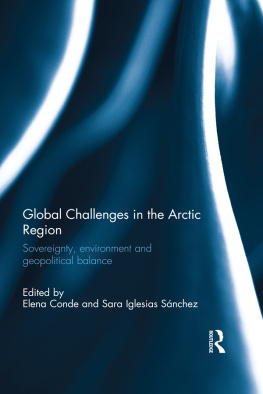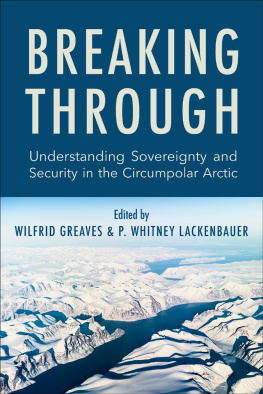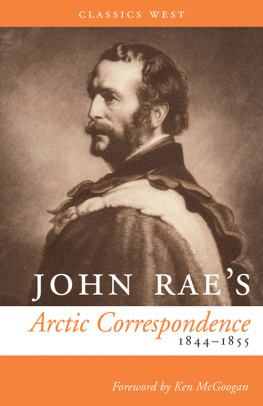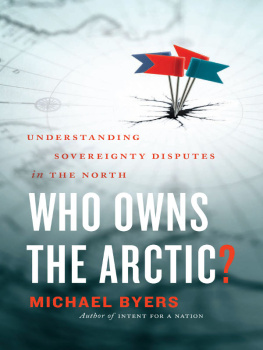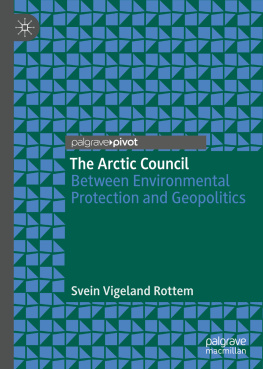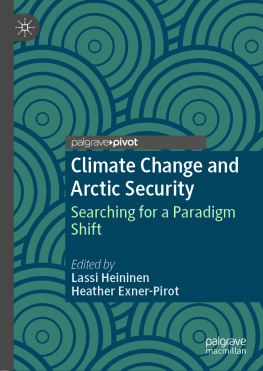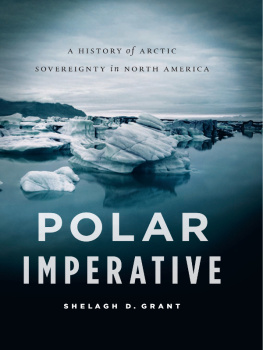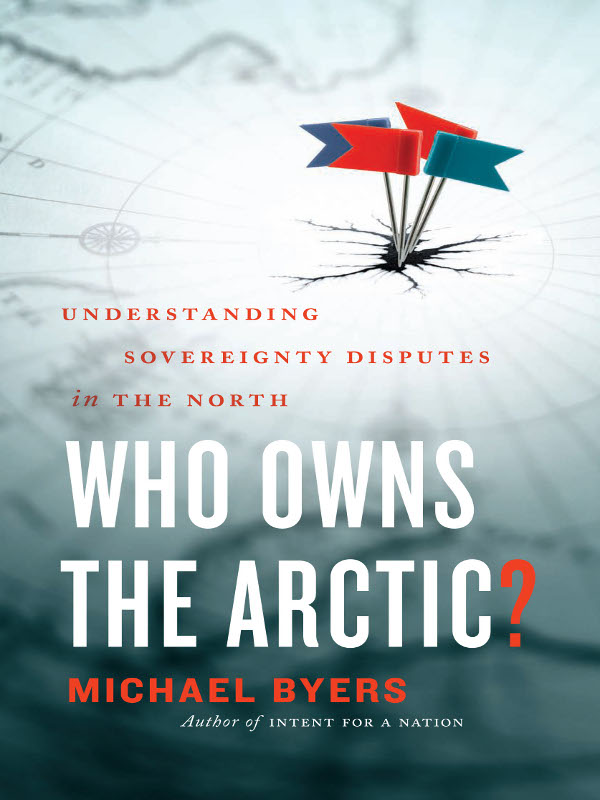
Who Owns the Arctic?
WHO
OWNS
THE
ARCTIC?
UNDERSTANDING
SOVEREIGNTY DISPUTES
inTHE NORTH
MICHAEL BYERS

Douglas & McIntyre
D&M PUBLISHERS INC.
Vancouver / Toronto / Berkeley
Copyright 2009 by Michael Byers
First U.S. edition 2010
09 10 11 12 13 5 4 3 2 1
All rights reserved. No part of this book may be reproduced, stored in a retrieval system or transmitted, in any form or by any means, without the prior written consent of the publisher or a licence from The Canadian Copyright Licensing Agency ( Access Copyright ). For a copyright licence, visit www.accesscopyright.ca or call toll free to 1-800-893-5777.
Douglas & McIntyre
An imprint of D&M Publishers Inc.
2323 Quebec Street, Suite 201
Vancouver BC Canada V5T 4s7
www.douglas-mcintyre.com
Library and Archives Canada Cataloguing in Publication
Byers, Michael, 1966
Who owns the Arctic? : understanding sovereignty disputes in the north / Michael Byers.
ISBN 978-1-55365-499-5
1. Arctic regionsInternational status. 2. Arctic regions International cooperation. 3. Canada Boundaries Arctic regions. 4. Arctic regionsBoundaries Canada. 5. Jurisdiction, Territorial Arctic regions. 6. Environmental protection Arctic regions. I. Title.
FC191.b93 2009 341.4209719 C2009-904549-4
Editing by Barbara Pulling
Cover and text design by Ingrid Paulson
Cover photographs by iStock and Janis Christie/Getty Images
Maps are from Canadas Unresolved Maritime Boundaries
by David H. Gray, IBRU Boundary and Security Bulletin, Autumn 1997. Used with permission.
Maps by Paul Edmunds.
Printed and bound in Canada by Friesens
Printed on acid-free paper that is forest friendly ( 100 % post-consumer
recycled paper ) and has been processed chlorine free
Distributed in the U.S. by Publishers Group West
We gratefully acknowledge the financial support of the Canada Council for the Arts, the British Columbia Arts Council, the Province of British Columbia through the Book Publishing Tax Credit and the Government of Canada through the Book Publishing Industry Development Program ( BPIDP ) for our publishing activities.

Contents
MY FIRST CHILDHOOD memory is of my father, a federal government scientist, returning from an expedition to Polar Bear Pass on Bathurst Island with a new, very bushy beard. That memory is partly responsible for my passion for the North. I thank Bob Byers for that, and for having read and commented on every page in this book.
I am also grateful to Suzanne Lalonde of the Universit de Montral. We have sailed the Northwest Passage, debated all the legal technicalities of that waterway, and co-authored several articles. In one sense, she is the co-author of this book, too, for she has profoundly influenced my thinking.
A number of other friends and colleagues have provided much valued input on different sections of the manuscript: David Gray, formerly of the Canadian Hydrographic Service; Rob Huebert of the University of Calgary; Ron Macnab, formerly of the Canadian Geological Survey and Canadian Polar Commission; James Manicom of the University of Toronto; Ted McDorman of the University of Victoria; Don McRae of the University of Ottawa; and Justin Nankivell of the Asia-Pacific Center for Security Studies in Honolulu.
Tony Penikett, the former premier of the Yukon Territory and chief devolution negotiator for the Government of Nunavut, has been generous with his time. So too has Thomas Berger, retired judge, commissioner in the Mackenzie Valley Pipeline Inquiry and conciliator in the ongoing dispute over the implementation of the Nunavut Land Claims Agreement Act.
Travelling in the Arctic is expensive and logistically challenging. I am grateful to Bill Rompkey and his colleagues on the Standing Senate Committee on Fisheries and Oceans for taking me on their tour of Nunavut in 2008. I am also grateful to Jack Layton, the leader of the federal New Democratic Party, who took me on his northern tour the previous year.
My research has been greatly facilitated by two grants from ArcticNet, a federally funded consortium of scientists from twenty-seven Canadian universities and five federal departments. Thanks to ArcticNet, I was able to spend eleven days on the Canadian Coast Guard research icebreaker Amundsen during its historic late-season voyage through the Northwest Passage in October 2006. Louis Fortier and Martin Fortier, the research and executive directors of ArcticNet, have my deepest thanks.
Many Inuit shared their experience and insights. They include John Amagoalik, the Father of Nunavut; Paul Kaludjak, the president of Nunavut Tunngavik Inc.; Letia Obed, the director of Aboriginal and Circumpolar Affairs for the Government of Nunavut; Paul Okalik, the former premier of Nunavut; Aaju Peter, lawyer, artist, cultural interpreter; Mary Simon, the president of Inuit Tapiriit Kanatami; and Sheila Watt-Cloutier, former president of the Inuit Circumpolar Council. ( Naqurmiik ). Thank you.
Other northerners also deserve my thanks: Joe Ballantyne, former Federal Land Use Administrator for Canadas Arctic islands; Dennis Bevington, Member of Parliament for the Northwest Territories; Paul Crowley and Lynn Peplinski of Iqaluit; Ben McDonald and Craig Yeo of Alternatives North in Yellowknife; Mark Salvor, devolution negotiator for the Government of the Northwest Territories; Clint Sawicki of the Northern Research Institute at Yukon College in Whitehorse; Shelley Wright, former northern director of the Akitsiraq Law School in Iqaluit; and Arthur Yuan, legal adviser to Nunavut Tunngavik Inc.
I am indebted to Donat Pharand and Franklyn Griffiths, retired professors at the universities of Ottawa and Toronto, respectively, for their extensive writings on the law and politics of Arctic sovereignty.
Arctic consultant Terry Fenge has been a reliable source of information and inspiration, as has Colonel ( retired ) Pierre Leblanc, former commander of Canadian Forces Northern Area. Two of Colonel Leblancs successors, Colonel Norm Couturier and Brigadier-General Christine Whitecross, kindly invited me to sit in on the all-important biannual meetings of the Arctic Security Working Group.
Captain Alain Garipy shared his vast knowledge of Arctic navigation during long nights on the bridge of the Amundsen, while Vice Admiral D. W. Robertson invited me to take part in an Arctic sovereignty simulation at Canadian Forces Base Halifax. Jacob Verhoef, the director of the Atlantic division of the Geological Survey of Canada, gave me a good grounding in seabed mapping. David Hik, the executive director of the Canadian International Polar Year Secretariat, invited me to give the speech that became the skeleton of this book.
Many American colleagues have also been helpful. Paul Cellucci, the former U.S. ambassador to Canada, partnered with me in a model Canada-U.S. negotiation on northern waters. Ashley Roach, formerly of the Office of the Legal Adviser, U.S. State Department, responded positively to a request to meet with him and his colleagues in Washington, D.C. George Newton, the former chair of the U.S. Arctic Research Commission and a former U.S. nuclear submariner, was generous with his insights. Diddy Hitchens of the University of Alaska, Christopher Joyner of Georgetown University and Doug Nord of Western Washington University have opened doors, organized events and supported grant applications.
Next page
